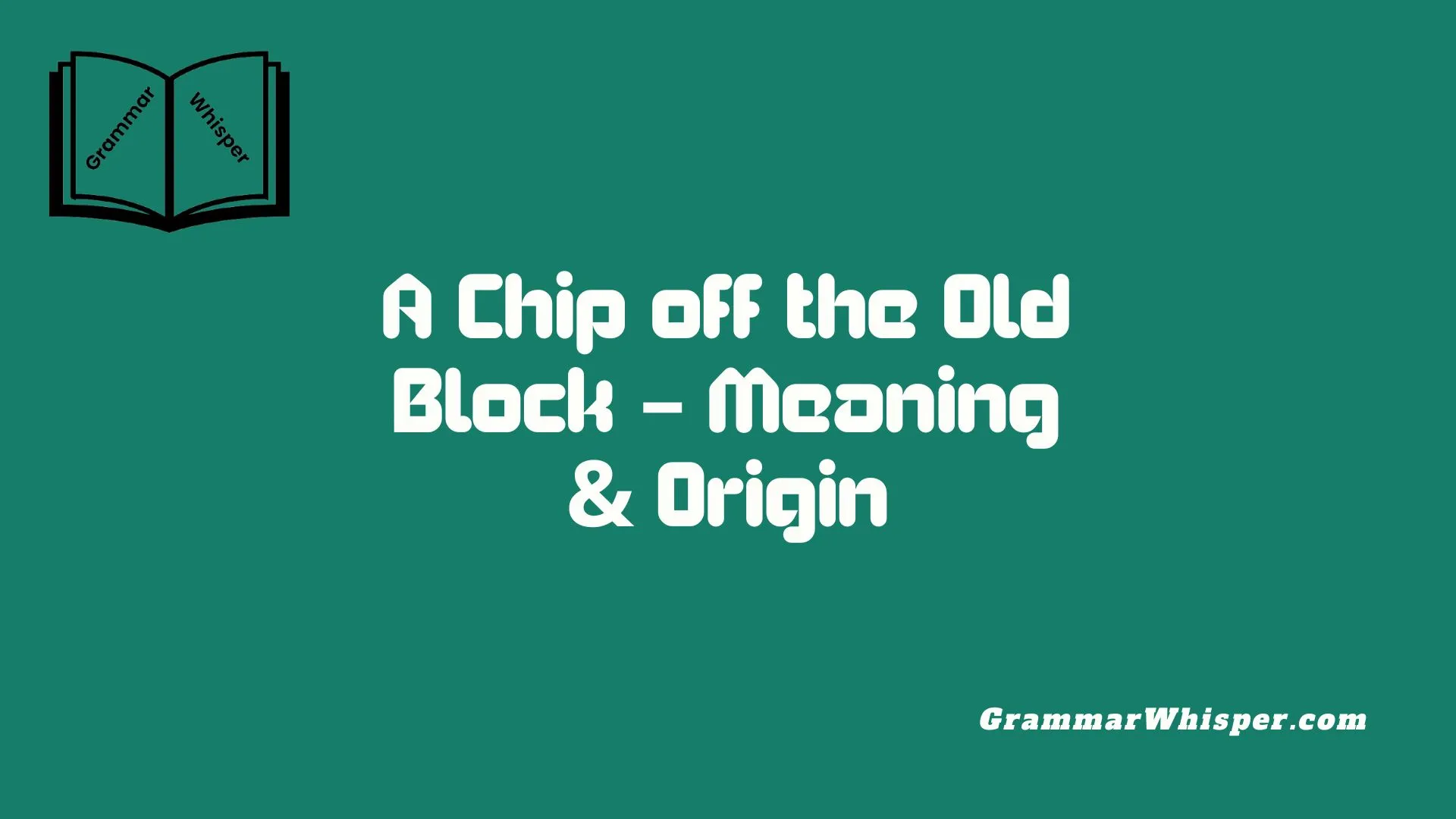Working with language over the years, I’ve realized that idioms like “A Chip off the Old Block” are more than just quirky sayings – they reflect cultural values and deepen our understanding of human connection. This phrase captures how traits, habits, and looks pass from one generation to the next, something I’ve seen firsthand in families who share unique behaviors and expressions. In everyday speech and timeless literature, the idiom appears again and again to describe how someone resembles a parent – not only in appearance but in character. These small but powerful moments make this idiom feel familiar and heartfelt.
When we dive into the story behind this rich expression, its significance becomes clear. It reveals strong identity threads that run through family lines, something I frequently come across while editing personal reflections. The quirks of the idiom, echoed in media and generational speech, show that these expressions evolve over time but keep their meaning. By choosing to use them thoughtfully today, we help the language grow while honoring its roots – connecting who we are with where we come from.
What Does “A Chip off the Old Block” Really Mean?
At its core, “a chip off the old block” describes a person, usually a child, who closely resembles their parent in character, behavior, or appearance. Imagine a wooden block where a small piece (chip) breaks off but remains unmistakably part of the whole. The idiom captures this idea of being fundamentally like one’s predecessor.
People often say it when they notice that someone shares strong qualities or habits with a parent or ancestor. For example, if a son shows his father’s wit and stubbornness, someone might remark, “He’s a real chip off the old block.”
Why does this phrase feel so natural? Because it speaks to a universal human experience – the way family shapes identity, for better or worse.
Why Familiar Sayings Like Idioms Matter
Idioms enrich our language by packing vivid imagery and shared understanding into short phrases. They:
- Add color and life to conversations
- Create quick connections through shared cultural meaning.
- Express complex ideas simply without lengthy explanation.
For instance, when you say someone is “a chip off the old block,” you immediately convey more than just similarity – you hint at lineage, influence, and legacy.
Other idioms convey resemblance too:
| Idiom | Meaning | Example |
| Like father, like son | Sons tend to be similar to their fathers | “Like father, like son – both love fishing.” |
| The apple doesn’t fall far from the tree | Children resemble their parents closely | “She’s a chip off the old block; the apple doesn’t fall far from the tree.” |
| Cut from the same cloth | Very similar in nature or behavior | “Those two are cut from the same cloth.” |
Idioms like these reflect how families and traits intertwine across generations.
Tracing the Origin of “A Chip off the Old Block”
This idiom dates back several centuries, with early traces in English literature from the 1600s. It likely comes from the woodworking world, where “block” refers to a solid piece of wood and a “chip” is a small fragment that breaks off. The metaphor highlights that the “chip” remains fundamentally the same as the original “block.”
Key Historical Notes:
- The first recorded use in English appeared in the 1600s, often in plays and poetry.
- The phrase has clear connections to craftsmanship, implying quality and authenticity passed down.
- Similar expressions exist in other languages, showing this is a shared cultural idea:
| Language | Equivalent Idiom | Literal Translation |
| German | “Wie der Vater, so der Sohn” | Like father, so son |
| Spanish | “De tal palo, tal astilla” | From such a stick, such a splinter |
| French | “Telle mère, telle fille” | Like mother, like daughter |
Over time, the phrase shifted from physical resemblance to also include personality, behavior, and values.
The Idiom in Family and Generational Contexts
Family bonds inspire the idiom’s use, especially when discussing children who inherit traits – whether looks, talents, or temperaments.
Nature vs. Nurture: A Chip off the Old Block?
The debate around genetics (nature) and environment (nurture) comes alive with this phrase. Does a child resemble a parent because of DNA or upbringing? Usually, it’s both.
Case Study: The Kennedys. Many members of the Kennedy family have been described as “chips off the old block” due to shared charisma, public service drive, and strong personalities. This blend of inherited traits and family culture exemplifies the idiom perfectly.
Physical vs. Behavioral Resemblance
- Physical resemblance is easier to spot: similar eyes, smiles, or statures.
- Behavioral traits – like stubbornness, kindness, or humor – are subtler but often more telling.
When the Apple Doesn’t Fall Far from the Tree
This related idiom also points to children taking after parents, reinforcing the idea of family legacy. For example: “You’re a chip off the old block. Like your dad, you have an eye for business.”
When It Doesn’t Fit
Not every child mirrors a parent. Some intentionally rebel or carve their paths. The idiom doesn’t apply when differences outweigh similarities.
Literary and Media Portrayals of “A Chip off the Old Block”
Authors and screenwriters love this phrase because family resemblance is fertile ground for drama, humor, and insight.
Literary Examples
- Shakespeare’s plays often explore parent-child dynamics and resemblance. In Hamlet, the young prince reflects many traits of his father.
- Charles Dickens frequently portrayed characters shaped by their family backgrounds, capturing that “chip off the old block” feeling.
Film and TV Examples
- In the Godfather series, Michael Corleone is often described as a “chip off the old block” because he inherits his father’s power and ruthlessness.
- In sitcoms like Modern Family, the phrase is used humorously when kids mimic their parents’ quirks.
These examples illustrate how the idiom deepens our understanding of character motivations and relationships.
Practical Uses and Modern Applications
Using “a chip off the old block” in everyday conversation feels natural when you want to highlight similarity within families. Here’s how to do it well:
When to Use
- Complimenting someone who takes after a parent
- Explaining behavior or talent shared across generations
- Introducing family traits in storytelling or presentations
How to Use the Phrase
- Keep it casual and conversational: “You’re a chip off the old block – just like your mom with those negotiation skills.”
- Pair it with other idioms for effect: “He’s a chip off the old block; the apple doesn’t fall far from the tree.”
Related Phrases to Enrich Expression
- “Cut from the same cloth”
- “Runs in the family”
- “Spitting image”
Common Misunderstandings and Misuses
Even popular idioms can be misused. Here’s how to avoid pitfalls:
| Misuse | Why It’s Incorrect | Correct Usage Example |
| Using it for non-family similarities | The idiom specifically implies family ties | “She’s a chip off the old block, just like her dad.” |
| Applying it when no resemblance exists | It loses meaning if the resemblance is absent | Avoid using if traits or behaviors differ significantly. |
| Overusing in formal writing | It can sound too colloquial or cliché | Use sparingly or choose a more formal phrase |
Idioms rely on context, so always consider your audience and tone.
Why “A Chip off the Old Block” Still Holds Strong
This phrase endures because it taps into something deeply human: the desire to see ourselves and our heritage reflected in those we love. It’s concise yet evocative, a linguistic bridge between generations.
Summary of What Makes It Work
- Strong metaphor rooted in tangible imagery (woodworking)
- Versatility in describing physical and behavioral likeness
- Cultural resonance across languages and histories
Final Thoughts
Next time you notice a family resemblance – whether in looks, habits, or passions – remember that you’re witnessing a “chip off the old block.” This idiom invites you to see the threads connecting past and present, reminding us how family shapes who we are.
Got a story about being a chip off the old block? Share it! How have you seen this idiom come to life in your own family?
Additional Resources and References
- Oxford English Dictionary on “chip off the old block”
- The Phrase Finder: Idiom Origins
- Merriam-Webster Dictionary
Tables and Visual Aids
Table: Similar Idioms about Family Resemblance
| Idiom | Meaning | Usage Context |
| A chip off the old block | Child resembles parent | Informal, conversational |
| The apple doesn’t fall far from the tree | The child closely follows the parent | Common, informal |
| Cut from the same cloth | Similar in nature | Formal or informal |
| Runs in the family | Traits common to family members | Informal, descriptive |
| Spitting image | Looks exactly like another person | Informal, visual resemblance |
By weaving together history, culture, family dynamics, and practical usage, this article gives you a full picture of the idiom “a chip off the old block.” Use it wisely and watch how it adds warmth and meaning to your conversations.
FAQS:
What does “a chip off the old block” mean?
“A chip off the old block” is an idiom used to describe someone, usually a child, who closely resembles their parent in appearance, behavior, or character. It highlights a strong similarity or connection between generations.
Where did the phrase “a chip off the old block” come from?
The phrase originated in the 1600s in English, inspired by woodworking imagery. A “chip” is a small piece broken off a “block” of wood, symbolizing that the smaller piece retains the essential qualities of the original. It’s been used for centuries to describe family resemblance.
Can “a chip off the old block” be used for non-family similarities?
Typically, no. This idiom specifically implies a family connection, mostly between parents and children. Using it for unrelated people who resemble each other might confuse the meaning.
How is “a chip off the old block” different from “the apple doesn’t fall far from the tree”?
Both idioms express family resemblance, but “a chip off the old block” usually emphasizes direct likeness or traits passed down, while “the apple doesn’t fall far from the tree” can imply broader influence or similarity, including behavior or values.
Is it appropriate to use “a chip off the old block” in formal writing?
Because the idiom is conversational and somewhat informal, it’s best used in casual or semi-formal contexts. In very formal writing, more neutral phrases like “resembles closely” or “shares characteristics with” might be preferable.











